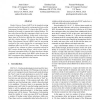Free Online Productivity Tools
i2Speak
i2Symbol
i2OCR
iTex2Img
iWeb2Print
iWeb2Shot
i2Type
iPdf2Split
iPdf2Merge
i2Bopomofo
i2Arabic
i2Style
i2Image
i2PDF
iLatex2Rtf
Sci2ools
140
click to vote
DSN
2006
IEEE
2006
IEEE
Improving BGP Convergence Delay for Large-Scale Failures
Border Gateway Protocol (BGP) is the standard routing protocol used in the Internet for routing packets between the Autonomous Systems (ASes). It is known that BGP can take hundreds of seconds to converge after isolated failures. We have also observed that the convergence delay can be even greater for large-scale failures. In this study, we first investigate some of the factors affecting the convergence delay and their relative impacts. We observe that the Minimum Route Advertisement Interval (MRAI) and the processing overhead at the routers during the re-convergence have a significant effect on the BGP recovery time. We propose a couple of new schemes to reduce processing overload at BGP routers during large failures, which in turn leads to decreased convergence delays. We show that these schemes combined with the tuning of the MRAI value decrease the BGP convergence delay significantly, and can thus limit the impact of large scale failures in the Internet.
Related Content
| Added | 11 Jun 2010 |
| Updated | 11 Jun 2010 |
| Type | Conference |
| Year | 2006 |
| Where | DSN |
| Authors | Amit Sahoo, Krishna Kant, Prasant Mohapatra |
Comments (0)

